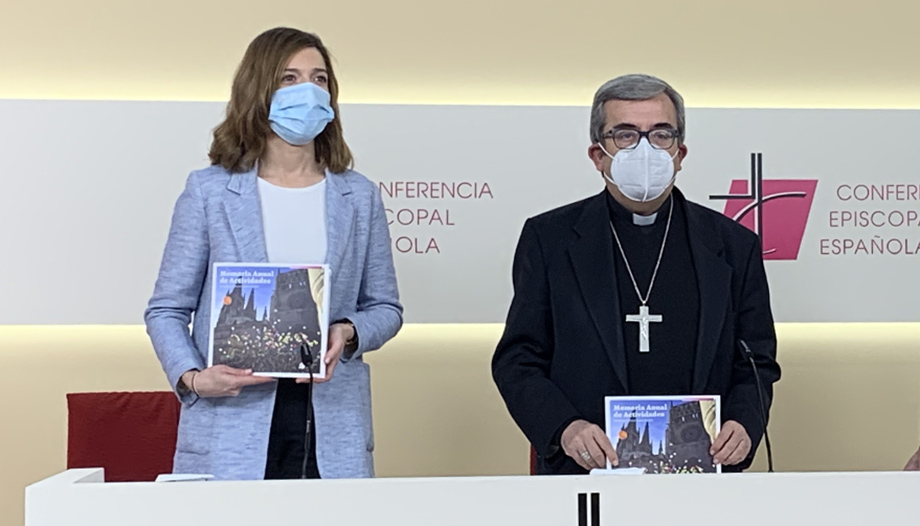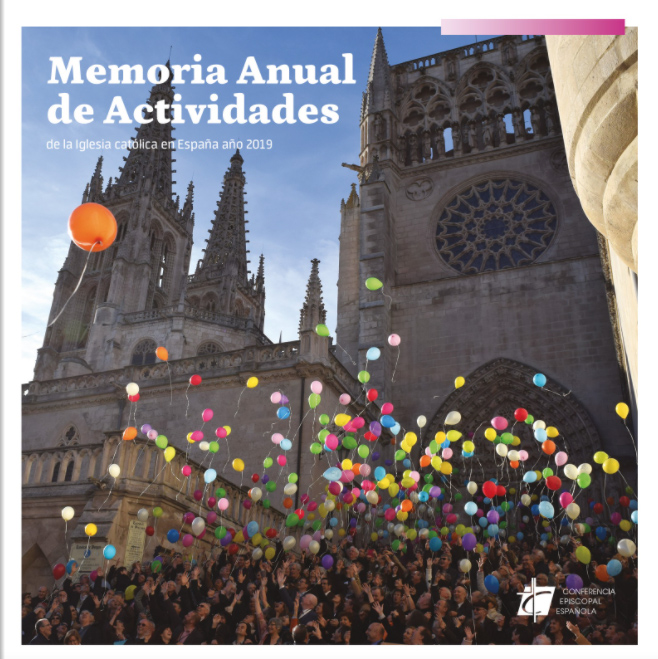Luis Argüello, Secretary General of the Spanish Episcopal Conference, and Ester Martín, Director of the CEE Transparency Office, were in charge of presenting this report on the Church's activities. A presentation that constitutes, in the words of Bishop Argüello, an exercise of "duty and gratitude" to society and to those who make possible the work of the Church in all the fields included in this Report.
"Faces give meaning to the numbers."
Luis Argüello, auxiliary bishop of Valladolid and Secretary General of the EEC, emphasized the effort that the Report on Church Activities makes to "put faces" to the data collected, with the aim of emphasizing the millions of people who make possible and benefit from this activity of the Church, whether sacramental, pastoral, charitable or welfare.
The Secretary General of the Spanish Episcopal Conference wanted to emphasize that the pandemic makes us see these data with a "characteristic color. The work of the Church in so many people and fields of society is more valued".
Ester Martín, director of the Transparency Office of the EEC, explained one of the main novelties included in this year's Report, which is that, when requesting data from the 69 Spanish dioceses and the diocese of Castile and León, "the declaration of corporate taxes has been requested" and she highlighted the progress that is being made throughout the Spanish Church in terms of transparency and auditing of accounts.
Martín emphasized the continuous improvement of this summary of ecclesiastical activity, which this year includes more than 100,000 pieces of information that require a considerable effort of analysis and processing.
"In education alone, the savings from Catholic schools to the State is ten times the amount received through the "x" of the Renta."
Ester MartinDirector of the Transparency Office of the EEC.
The director of the Transparency Office emphasized that what these data show us is how "the Church is present in the problems and needs of our society: the loneliness of the elderly, help for couples with problems, care for women victims of violence, minors or unemployed people... The Church has an answer to these real problems that are on the street.
Martín also highlighted the work of economic efficiency carried out in the Spanish Church, especially in recent years: "In education alone," he said, "the savings made by Catholic schools to the State are ten times greater than the amount received through the "x" of the Renta (Income Tax).
Ester Martín also wanted to point out some of the fields in which the work of the Church has made a greater effort in 2019, among which are the assistance to immigrants, the centers for the protection of women, or the centers for poverty alleviation and labor promotion.
In fact, the data show that, in the last 9 years, the Church's welfare centers have increased by 71.69% and how, in the last known fiscal year, that of 2019 the expenditure allocated in the Spanish dioceses to welfare work increased by 9 million euros.
4 million people assisted with health care
Not surprisingly, the Report includes truly significant figures, taking into account that they predate the Covid19 pandemic. In the section on beneficiaries of social centers and assistance from the Church in Spain, more than 4 million people were served in 2019. These include, for example, the centers for poverty alleviation, legal advice, defense of life or promotion of women, to which the director of the Transparency Office referred at the press conference.
One of the curious data included in the Report is the 9 million people who regularly attend Mass, although the percentage of reception of sacraments such as Marriage or Baptism continues to fall in our country.
The Renta data
The economic part of this Report is linked to the 2019 economic activity and includes the tax allocation data recorded in favor of the Church in the 2020 Income Tax Return.
DATO
301.208.649€Received by the Catholic Church in Spain through the 2019 tax allocation.
With regard to the 2019 income, taxpayers allocated 301,208,649 euros to the Church, which represents an increase of 16,092,852 euros in relation to what they allocated in 2018. Of this amount, 70%, some 206 million euros, was distributed among the various Spanish dioceses for their support.








